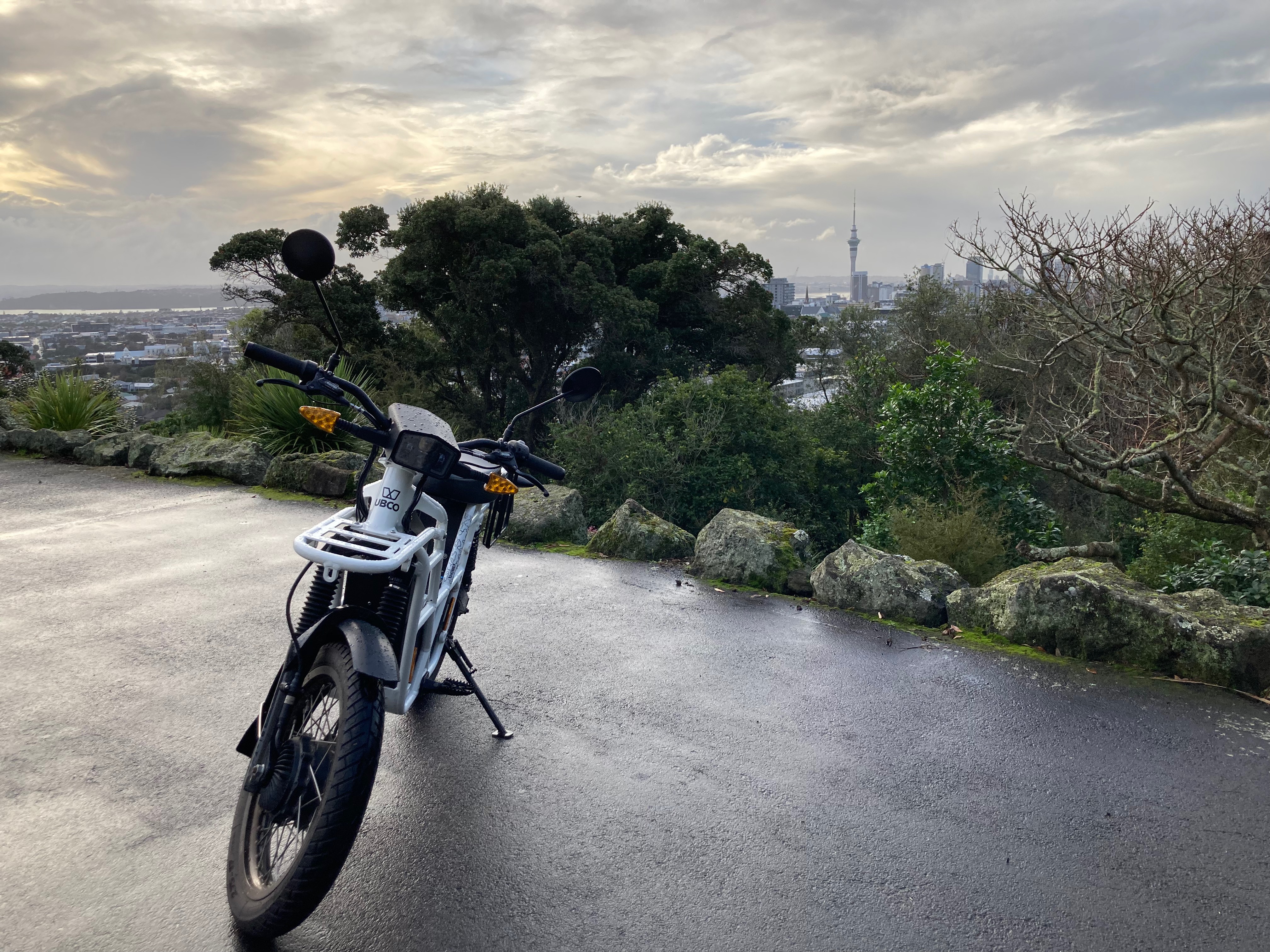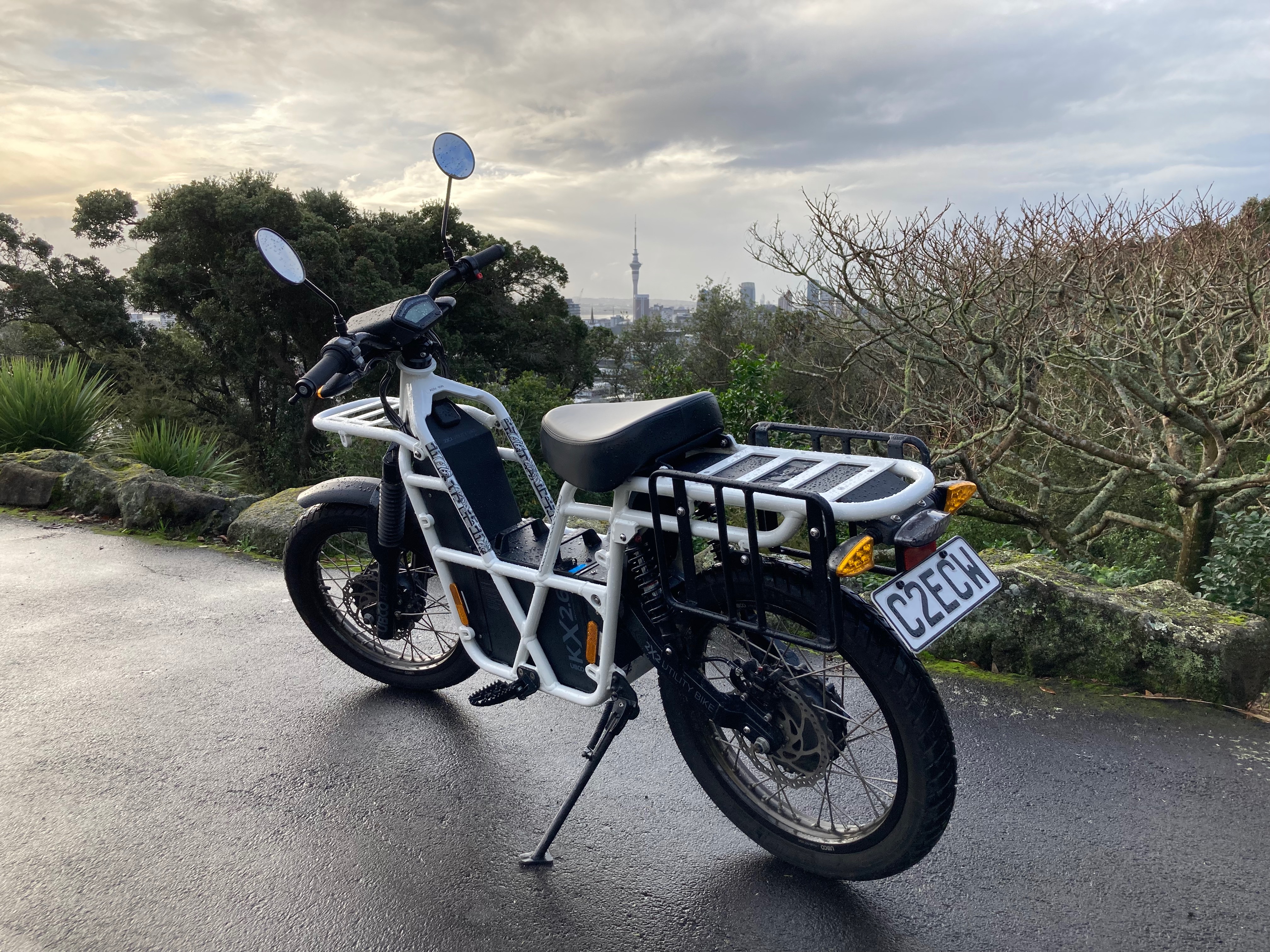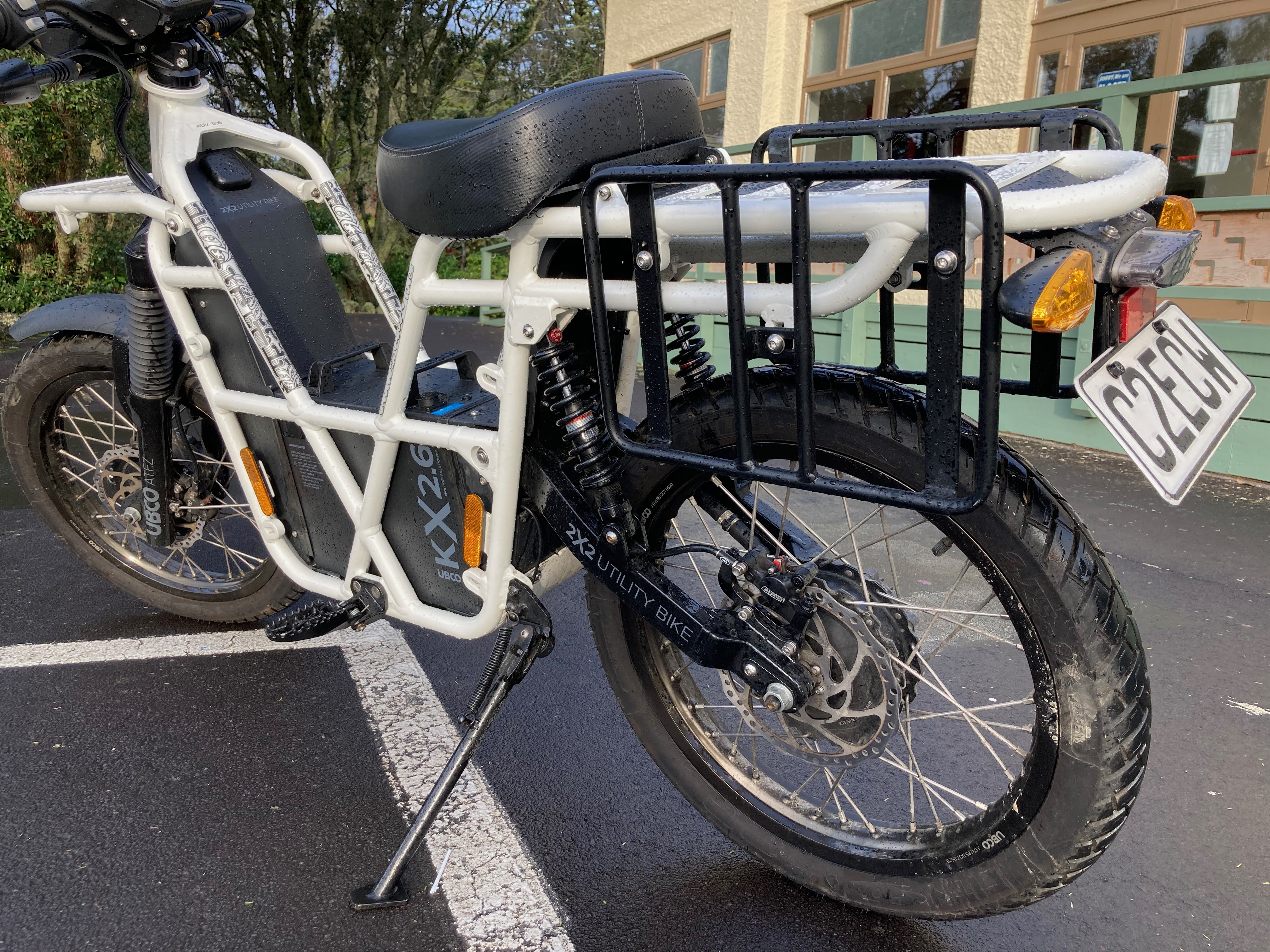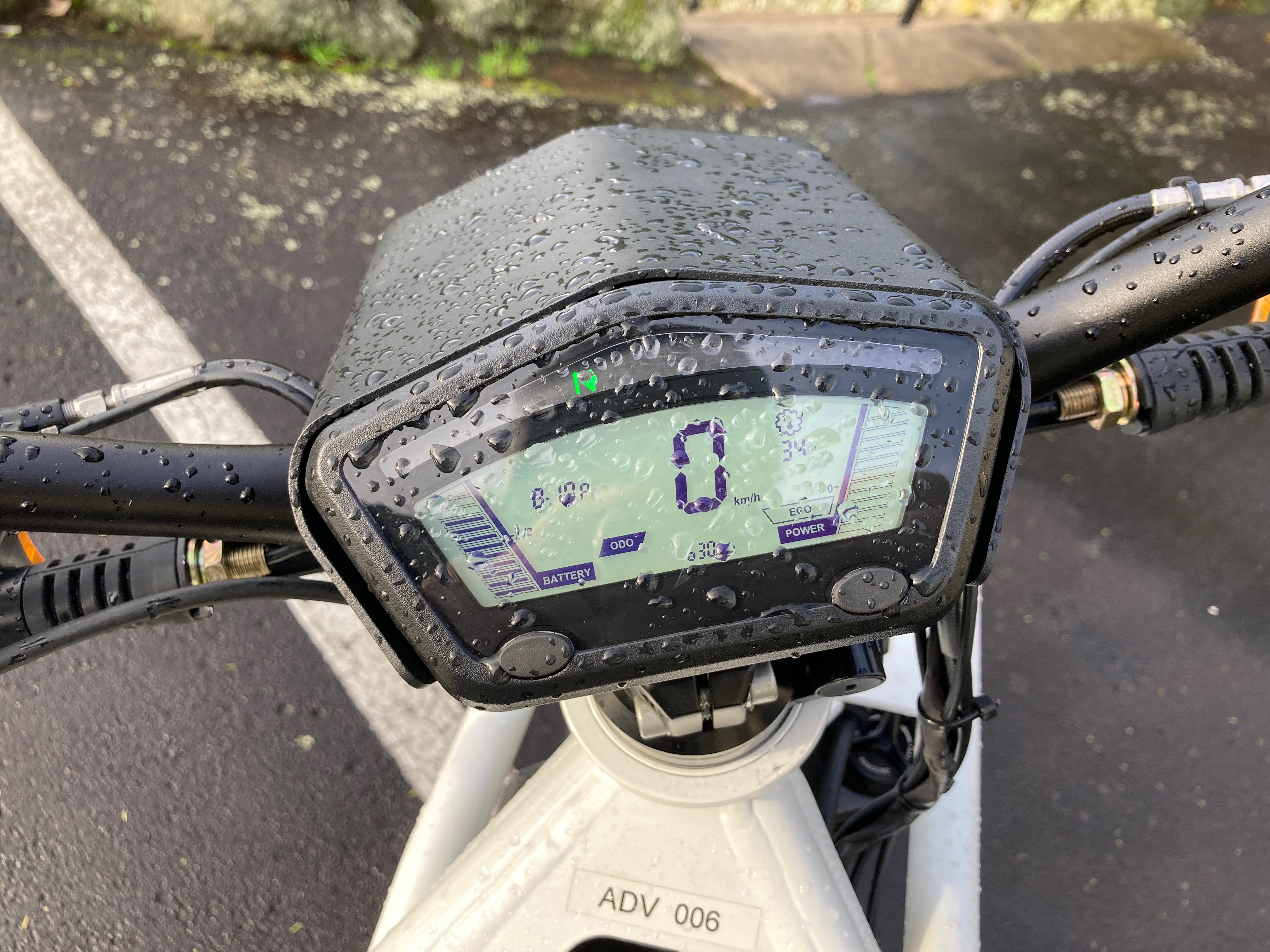A recent move to Auckland, New Zealand — a city with lackluster public transit and hills that can turn a quick bike ride to the store into a sweaty workout — piqued my interest in e-bikes.
Strong demand and skyrocketing prices, however, made it difficult to access these coveted e-bikes here in Aotearoa, the Land of the Long White Cloud. That changed after learning about Ubco, the New Zealand-based electric utility bike startup that recently raised $10 million from investors.
The company provided me with the Ubco 2X2 Adventure Bike for nearly a month, which gave me plenty of time to put it to the test.
I may not be Ubco’s target audience, although I did my best to use the bike as its design suggests, and packed it up with bags of books and other heavy things that might simulate the weight of delivered garlic bread, mail and other packages. The Ubco 2X2 Adventure Bike is made for city utility riding, with the option of going off-road, which I would later try with gusto.
The company’s flagship is the Ubco 2X2 Work Bike, an electric dirt bike that was originally designed to help farmers. The fresh capital the company raised in June will be used to expand into existing verticals like food delivery, postal service and last-mile logistics, scale a commercial subscription business and target sales growth in the United States.
Domino’s drivers in Auckland, and I hear in the U.K., can be seen delivering hot pizzas on Ubco bikes, and the company has a range of other national clients, like the New Zealand Post, the Defense Force, the Department of Conservation, and Pāmu, or Landcorp Farming Limited, as well as other local restaurants and stores.

Image Credits: Rebecca Bellan
The handoff
CEO and co-founder Timothy Allan drove out from the company headquarters in Tauranga to hand off the bike personally. It was a sunny day in my neighborhood, and I listened impatiently as he described the various bits and bobs, how to work the machine and how to charge it.
Allan helped me download the Ubco app to pair my phone with the bike, which, among other functionalities, allowed me to select beginner mode, which would cap the vehicle speed at around 20 miles per hour. I made a mental note so that I could write about it here, but was determined to reach the top speed of 30 miles per hour right away.
I did, and it was … pretty sick. I’m not supposed to gush, but man! It’s a sweet ride. Here’s why:
Appearance
The Adventure Bike comes standard in white and sits on 17×2.75-inch multiuse tires with aluminum rims, both of which are DOT compliant. My version also had Maori decals on the frame, in a nod to the indigenous people of New Zealand.
The bike’s height is about 41 inches and the seat comes to 32 inches. From wheel to wheel, it’s about 72 inches. The payload, including the rider, is about 330 pounds, so both my partner (6’2” man) and I (5’7” female) rode this bike with ease, needing only to adjust the wide rearview mirrors sticking out of the handlebars. And no, we didn’t ride it together. This bike is designed as a one-seater.

Image Credits: Rebecca Bellan
That said, there’s a little cargo rack above the back wheel, which holds the license plate (apparently these are classified as mopeds, which require registration in many places) and any other cargo one might carry. I didn’t try, but I reckon it could hold at least five pizza boxes tied down with a bungee cord. The bike rack also allows for saddlebags to be strapped on. Ubco sells what it calls the Pannier Back Pack, a weather-resistant roll-top cargo bag, for $189 that slots in very nicely and is actually a quality bag with 5.28-gallon capacity.
Accessories aside, the alloy frame is lightweight and step-through, which I love in a bike — it lets me start to shift myself off before I fully park and I feel super agile and swift. Speaking of parking, the rules are different everywhere, I assume, but here, you park it on the street or in parking spaces, not on the sidewalk. It’s got a kickstand to hold it in place, and you can lock the front wheel so no one can just wheel it away. They could, however, probably chuck it into the back of their pickup truck if they so chose, since it’s only 145 pounds.
The appearance of the bike stood out, and not just to me. During my multiweek test drive, numerous tradesmen and bike folks went out of their way to compliment its design, the exact demographic that Ubco is aiming for.
Rideability
The lightness of the bike means that it’s easy to take off and find your balance. The battery is also in the middle of the frame, just near where your feet sit, which anchors the bike and gives you a stable center of gravity.
The lightweight nature of the bike is a blessing and a curse. Cutting a turn is easy, but on a windy day and an open road, there were moments I worried that I’d be knocked off it — but maybe that had more to do with riding next to a 10-wheeler on the street. Because it’s so light, it did feel a bit strange to me to be in the street lane with the other bigger, meaner cars rather than in the bike lanes.
The bike accelerates quickly via the fully electronic throttle control, even up steep hills, due to the high torque geared drivetrain. The drivetrain has two 1 kw Flux2 motors with sealed bearings, active heat management and active venting for residual moisture — a necessity in this moistest of cities.
The acceleration sound, which mimics those of a gas-powered dirt bike but with a softer electronic tone, was a surprising plus. I didn’t realize how much I relied on my sense of sound to tell how fast I was going until I rode the Ubco.
The braking system was a bit touchy. It felt very sensitive to me, probably because hydraulic and regenerative brakes are operating together on the vehicle. There’s also a passive regenerative braking system, which I gather is what put the brakes on for me when I was just trying to coast down one of those mammoth hills.

Image Credits: Rebecca Bellan
Both the front suspension, 130 mm, and rear suspension, 120 mm, have a coil spring with a hydraulic dampener and have preload and rebound adjustment. In other words, the shocks are awesome. Even when I actively drove myself off sidewalks and over speed bumps, I could barely feel a thing.
To test its off-road capabilities, I took the bike to Cornwall Park, where I ran it at full speed on the grass, swerving between trees, flying over roots and rocks, doing doughnuts in the field. It was good fun and I felt completely in control of the vehicle. I can imagine why farmers have turned to the Work Bike.
When it was time to test out its use as a delivery bike, I packed the two saddlebags with books and groceries and took it for a spin. Still a great ride, although I was a little wobbly turning corners until I got the hang of it.
Value
Since the Ubco Adventure Bike doesn’t neatly fit into a specific bike category, it’s not a simple price comparison. An electric moped, like a Lexmoto Yadea or a Vespa Elettrica, could set you back anywhere from $2,400 or $7,000, respectively. Electric dirt bikes could cost anywhere from $6,000 to $11,000 for something like a KTM or Alta Motors. That said, Swedish electric motorbike startup Cake did just come out with its latest made specifically for city riding, the Makka, at $3,500. It looks a lot like the Ubco, but it’s a bit smaller.
With that in mind, the Ubco Adventure Bike costs $6,999 with a 2.1 kW power supply and $7,499 for a 3.1 kW power supply. Depending on what you want it for, I’d say it’s somewhere around mid-range for a bike like this. Since you’d probably use it for work-related activities, it could get a tax write-off. Plus, you want quality in a bike that’s down to do some heavy lifting, and Ubco has plenty of that. It’s not only a handy utility bike, but it’s also got some excellent tech under the proverbial hood, which we’ll get to later.
Ubco estimates a 10- to 15-year life expectancy, depending on use. Over-the-air software updates, replacing parts and full refurbishments can help keep the bike going for longer. The company encourages riders to send back the dead bikes because it’s committed to full product stewardship.
That said, if you wanted to buy a bike now, it’d be a preorder (unless your local Ubco dealer had some in stock). Ordering now could get you an Ubco by September if you live in the States. The company says it’s still feeling the effects of COVID, with high demand and a stretched supply chain causing delays. The preorder requires a $1,000 deposit.
Ubco also has a subscription model, which is mainly available for enterprise customers at the moment and priced on a case-by-case basis. However, it’s piloting subscriptions for individuals in Auckland and Tauranga before rolling the program out globally. Subscriptions will start at around NZD $300 per month for a 36-month term.
Range
The Adventure Bike comes with either the 2.1 kWh battery pack, which has around 40 to 54 miles of range, or the 3.1 kWh, with 60 to 80 miles.
The battery is run off a management system, called “Scotty,” to monitor real-time performance and safety. The battery, which is sealed with alloy and vented during use, is made with 18650 lithium-ion cells, which means it’s a powerful battery that can handle up to 500 charging cycles. Ubco says its batteries are designed to be disassembled at the end of life.

Image Credits: Rebecca Bellan
The 10 amp alloy fast charger can fuel the battery fully within four to six hours. You can charge it while it’s still in the vehicle by just connecting it to a power outlet, or you can unlock the battery and yank it out (it’s a little heavy) and charge it inside. Note: Charging is loud. Not sure if this is standard, but probably is.
I charged it every two to three days, but that will depend on use and where you are. It’s winter in Auckland, so a bit cold, which affects battery life, and the hills are brutal, which also use up a lot of battery life.
I’d ride it downtown and around my neighborhood every day, but I’d wager a delivery driver would need to charge it nightly. As I mentioned earlier, the battery can be removed for charging, so if you take it to work, you can always take it up to the office or wherever to charge while you’re doing other things.
Tech features
Vehicle management system
The vehicle runs off what Ubco calls its Cerebro vehicle management system, which integrates all electronic and electrical functions of the vehicles and provides control and updates via Bluetooth. Ubco builds with end of life in mind, so the CAN bus is isolated so future CAN devices can be easily integrated.
Now, one of my first questions, given the heftiness of this bike and the likelihood of gig economy workers who would ride it for work living in urban dwellings, was this: How can I ensure no one will steal this thing when it’s on the street, because there’s no way I’m lugging it up to my fifth-floor walkup?
Like I said, you can lock the wheel in place, which would make it far more difficult for someone to wheel it off. If someone did decide to capture the whole cumbersome vehicle, Ubco would be able to track it for you. Each Ubco bike has telemetry, aka a SIM card, hardwired inside, and that can help provide data that can be used for location, servicing, theft, safety, route planning, etc.
This VMS architecture is made for handling fleets via Ubco’s enterprise subscription vehicles, but it obviously has other uses, like providing peace of mind (personally, I’d still lock it up with chains, but I’m a New Yorker and trust no one). Obviously, if you think this telemetry is creepy, you can opt out, but it does come standard with subscriptions, allowing subscribers to track their bike’s location on the app.
Display

Image Credits: Rebecca Bellan
Mounted on the handlebar is an LCD display that shows speed, power levels and more. Also on the handlebars are switch controls for high or low beams, indicators and a horn. I found the indicators to be a bit sticky and sometimes I would slip and hit the horn. What I wish the handlebars also had was a mount for your phone so you could follow directions. I had my headphones in and was listening to Google Maps tell me how to get around, but that felt less safe and efficient.
Turning it on
You can turn the power on with a keyless fob by either clicking the button on the fob or the button on the handlebars. I will note that the keyless fob button is weirdly sensitive. At multiple points, I had it in my pocket with my phone or other pocket inhabitants and it must have knocked into the button, turning the vehicle off while I was riding it. Thankfully, that never happened anywhere busy, but that’s something to be wary about.
App
As I mentioned earlier, you could pair your phone, as well as other users’ phones, to the bike using the app. The app allows you to choose learner mode or restricted mode, which controls ride settings; turn the bike and lights on and off; change the metrics; and check the status of things like battery life, speed and motor temperature. It’s basically all the info on the dash, but on an app. I didn’t really feel the need to use it.
Lights
The LED headlights are on at all times when the vehicle is turned on, but there’s also a high and low beam, as well as peripheral parking lights, all of which are designed for disassembly at the end of life. There are also LED rear, brake and number plate lights, as well as DOT-approved indicator lights.
Other stuff
Among the features that don’t fit neatly into the other categories, there’s the field kit, which is fastened to the lift-up seat and contains a user manual and tools to set up and maintain the 2X2, which is really handy. Usually, when people buy an Ubco bike, it comes in a box and there are “a few simple steps to follow to get it ready to ride.” There’s also an UBCO University course that shows how to set it up. If you buy from one of Ubco’s dealers, they’ll unpack it and set it up when you come to collect it.
Maintenance
Maintenance comes with the cost of a monthly subscription. Ubco has a network of technicians placed wherever the company sells its bikes if they’re in need of fixing. If there’s no authorized mechanic nearby, Ubco’s head office will work with customers to help them fix the bike. Ubco did not respond to information about how many authorized mechanics are in its network.
Again, being from New York, I’ve seen probably thousands of delivery riders on bikes and mopeds, oven mitts covered in a plastic bag taped onto the handlebars so drivers can keep their hands warm during the colder months. This bike can handle a hefty load for delivering goods, it’s quick and agile for weaving in and out of traffic, and it’s easy to ride and use.
The subscription offering, especially for enterprise, makes this a great city utility bike that can probably handle a range of weather conditions. I already know it can handle rain and mud, so all signs point to success in the sloshy, icy hell of a Northern city winter. And for the adventurer — the person who just wants to ride something sweet on- and off-road, out of the city and into the wilderness — this is also a great consumer ride that will last you quite a while.
